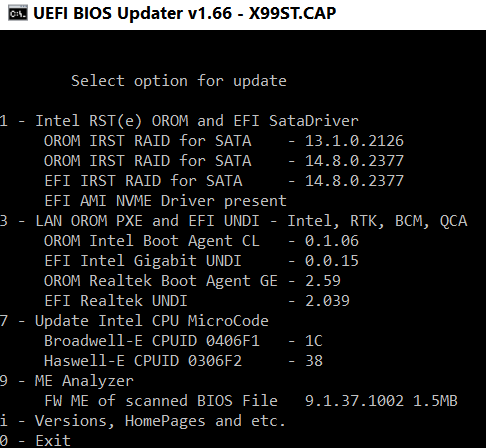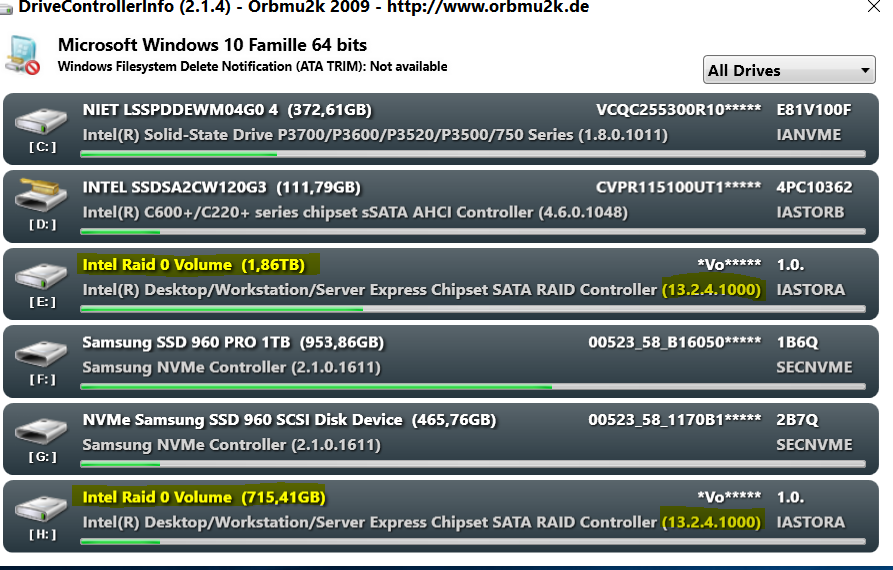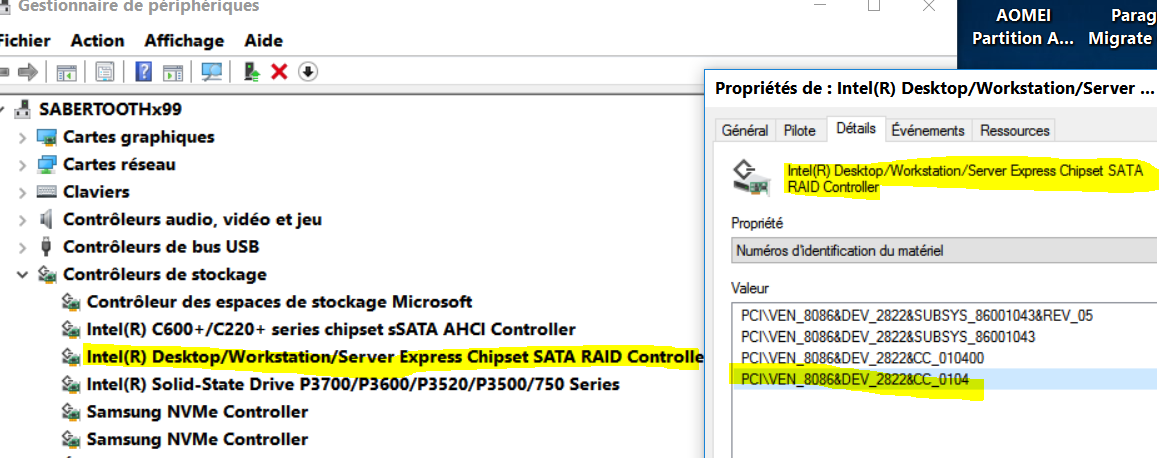I went through all of that info , there does not seem to be one overwhelming choice , thats why i was confused about the 3 separate versions i posted . When looking at it again it looks like the 15.2 etc… is the appropriate driver.
What about the chipset driver lol, it takes me forever to figure out just this one driver , chipset driver i have no idea at this point .
Instead of me continuing to guess and spending hours on here reading everything and still being as confused as ever whats the chance i could get some assistance? Some of us really do have severe learning disabilities and are not just lazy individuals who want someone else to do everything for them .
There are plenty of those types of people out there but i happen to not be one of them , when i say i really need help it means i really need help . Questions like the below are not helpful since it’s apparent that i’m not even sure i got the ACHI driver version correct , how about providing info as to what chipset version you would recommend ?
You are right - there is no outstanding stable and performant AHCI driver available for your special system. All the 3 Intel AHCI drivers, which you had mentioned within your first post, are matching the chipset of your Dell system and will give your SSD(s) resp. HDD(s) a very good performance.
Only you as the owner of your system can find out, which one of the various compatible AHCI drivers may be the “best” for you. It is not a big deal to compare the performance of 3 different AHCI drivers. What may be better for other users, may not be good enough for you.
So you recommend trying all 3 and decide for myself . Can you advise me on the chipset specific driver please .
Thank you
All 3 Intel RST(e) drivers do fully support your chipset.
I just noticed the posts above my original one that i had not seen until now . Now everything makes a little more sense , i was convinced you were meaning for me to go back and read everything from page 1 onward .
My apologies Sir.
I think i will try the latest possible driver version as i would think that makes more sense , of course i could be wrong since i live Murphy’s law and if something could go wrong it will go wrong , there’s never been an exception in my case.
Thanks again
Hello friends. A pleasure to find this website. I have a question. I have updated an old machine with RAID1 to Windows 10 and installed this
The truth is that with this windows driver I am having better performance than ever before. My question is what happens to the intel RST software. Is there any way to install it independently ?. I will have some problem if I stay with the windows driver and I do not install the RST software ?. Thank you very much!
@MrElliot :
Welcome at Win-RAID Forum!
If you are sure, that this Win10 in-box Intel RAID driver gives your RAID system the best performance, it is ok, although according to my own benchmark tests this RAID driver was never under the best.
Unfortunately you didn’t post any information about the Intel chipset of your system. So I cannot say, which Intel RAID driver may be better for your system.
I do not recommend to install an Intel RST Software with another version without installing the matching Intel RST RAID driver as well.
By the way: An Intel RST Software v13.2.0.1022 doesn’t exist.
For RAID1 users I recommend to install the Intel RST Software.
Regards
Dieter (alias Fernando)
Hello!. Thanks for your help. It’s a x48 ICH9R
Ok. I’m going to try> Intel RST AHCI / RAID Drivers & Software Set v11.2.0.1006 WHQL <(I think it’s the recommended one) and give you my feedback. Thank you!
EDIT by Fernando: Unneeded parts of the fully quoted post removed (to save space)
I have updated the drivers and as expected I lost some performance. I am not worried because I am interested in the integrity of the data. But it had never reached the + 100MB / s it reached with the windows 10 drivers ![]()
Windows 10 default Intel RAID driver (left picture) and Intel RST RAID driver v11.2.0.1006 (right picture):

Many thanks for your work Fernando! Using an old ASUS motherboard (Intel P35/ICH9R chipset) with the recommended Universal 64bit Intel RST AHCI+RAID driver v11.2.0.1006 driver with no issues for several months. Starting today, one of my internal hard drive just disappears when I try to copy files to it. With a PC restart (or sleep/wake) the drive re-appears but problem remains. I removed the driver, now using the Microsoft Standard AHCI Controller driver and the issue is gone.
Is it possible that this problem is caused by the latest Windows 10 Cumulative Update? (v.1607.14393.953, x64)
@MagneticStuff :
Welcome at Win-RAID Forum!
Yes, this seems possible for me.
With the Win10 and especially its latest Builds it is rather difficult to use old, but very performant and stable running storage drivers.
Regards
Dieter (alias Fernando)
I re-installed the 11.2.0.1006 driver and everything seems ok again, let’s hope it lasts. Perhaps the update messed something up, who knows.
update: Major problem remains unfortunately, back to the standard Microsoft driver. Driver-update programs suggest an Intel 9.1.9.1005 (25 Jul 2013) driver. In the past it did not solve an issue I had (11.2.0.1006 solved it, thanks to Fernando’s guide) so I’m probably going to revert to standard IDE mode (non-AHCI). 
Hello Fernando I am in a bit of a mess here trying to figure out what option/model on the driver list I should download when installing Intel RST(e) v14.8.12.1059 through device manager, properties/update driver, Browse Pc, let me pick, and have a disk when I choose the driver iaAHCIC, I get a row of different selections to choose from which one would be the right choice, or does it not matter?
I am currently on x99 board with a 5820k using 1tb ssd and 2x500gb ssd.
@jujubeans :
Welcome at Win-RAID Forum!
You can verify the HardwareIDs of your on-board Intel SATA AHCI Controller by doing a right-click onto it and choosing the options “Properties” > “Details” > “Property” > “HardwareIDs”.
AFAIK the DeviceID of your on-board Intel SATA AHCI Controller is DEV_9D03 and the name given by Intel is “Intel(R) 6th Generation Core Processor Family Platform I/O SATA AHCI Controller”.
Regards
Dieter (alias Fernando)
Thank You, I appreciate that quick response.
EDIT by Fernando: Unneeded parts of the fully quoted post removed (to save space)
@Fernando
Here is the UBU scan screenshot of the new released ASUS official Sabertooth x99 BIOS v3505.

You can observe the occurence of 2 different OROM IRST RAID for SATA modules versions and one EFI IRST RAID for SATA version.
Currently here is the DriveControllerInfo I have:

On what OROM IRST RAID for SATA version do we have to refer to choose the ‘best’ Intel AHCI/RAID driver ?
I have no ambiguity for the sSATA AHCI mode driver for Controller_2.
A contrario for the two different RAID 0 volumes controlled by Controller_1 chipset I am perplex:

May be I have to get another W10 Intel RAID driver version to handle this main Controller_1 which is the alone on this platform offering RAID mode capability ?
It depends on the Intel BIOS RAID ROM module, which is loaded while booting (you can check it via CTRL+I). As long as you are booting in UEFI mode, the Intel RAID ROM version doesn’t matter, because none of the Intel RAID ROM modules will be used.
Why are you perplex?
Your mainboard has 2 different Intel SATA Controllers, but only one of them has been set to “RAID” mode.
@Fernando ,
I agree the Intel RAID ROM version does not matter when booting in UEFI mode.
Booting in UEFI mode BIOS menu "Advanced\Intel RST does display "Intel RST 14.8.0.2377 RAID driver". I assume it is the EFI IRST RAID bios module.
Questions:
Does, when booting in UEFI mode the EFI IRST RAID for SATA BIOS module is used even if booting from i750 NVMe device ?
Does, after booting EFI IRST RAID for SATA BIOS module is also used in correlation with the W10 iRST RAID driver to handle the RAID volumes ?
Yes.
Yes.
When you boot in UEFI mode, no Option ROM modules will be used/loaded, provided, that a matching EFI module is available within the BIOS.